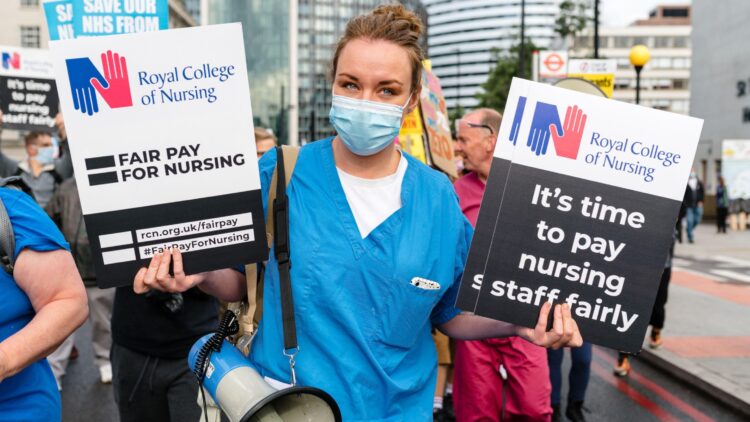By Charlotte Webster-
A nursing union representing hundreds of thousands of nurses has voted to hold the first nationwide strike in its 106-year history. The Royal College of Nursing (RCN) said the strike will affect the majority of NHS employers in the UK as nurses take action against unsatisfactory pay levels and patient safety concerns.
Nurses in Scotland and Northern Ireland voted for action. In Wales, all but one health board did too. However, in England the turnout was too low in half on NHS trusts for strikes to go ahead.
RCN general secretary, Pat Cullen, told the BBC: “Anger has become action – our members are saying enough is enough.”
She explained that nurses have been getting “a raw deal” on pay for a significant number of years now.
“Ministers must look in the mirror and ask how long they will put nursing staff through this.” she said.
The union said that many of the biggest hospitals in England would see strike action but others “narrowly missed” the legal turnout thresholds required for action. All NHS employers in Northern Ireland and Scotland would be included and all bar one in Wales met the threshold, they added.
RCN general secretary and chief executive Pat Cullen said: “Anger has become action – our members are saying enough is enough.
“The voice of nursing in the UK is strong and I will make sure it is heard. Our members will no longer tolerate a financial knife edge at home and a raw deal at work.
“Ministers must look in the mirror and ask how long they will put nursing staff through this.
The RCN believes current NHS services are “not safe” and has accused ministers of failing to heed their concerns.
Action
The action has come after the government gave NHS staff an average of 4.75% rise this year – the lowest paid get more.
And, Scotland offered a flat rate of a little over £2,200, effectively meaning a newly qualified nurse would get about 8% more.
Northern Ireland nurses are still waiting to receive a pay award as there is no working government.
The RCN is representative of two-thirds of nurses in the NHS. The union asked for 5% above the RPI rate of inflation, which stands at over 12%.
Nurses had on a number of occasions been forced to eat out of food banks and have also been found to be eating leftover food from patients’ plates on some occassons- a disgraceful state of affairs.
Health and Social Care Secretary Steve Barclay said the government “hugely values the work that nurses do”, and had already committed to raising their wages in line with recommendations from the independent pay review body.
He also told reporters they “recognised the contribution of nurses” last year, giving them a pay rise of 3% more than most other public sector workers.
Mr Barclay added: “We also need to recognise that these are economically challenging times. We need a strong economy in order to pay for a strong health care system and a demand of 17% – three times what most non-public sector workers will receive – is out of step with the economic circumstances that we face.”
The health secretary said his “door is open” for talks with the RCN and he looked forward to meeting them “in the days ahead”.
The government said the Royal College of Nursing (RCN) is asking for a 17.6% pay boost, which, if applied to all NHS staff apart from doctors and dentists, would cost £9bn.




